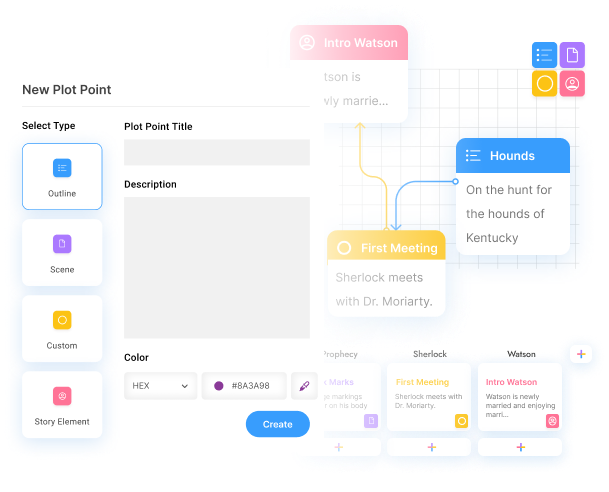Worldbuilding on LivingWriter
What makes fiction fictional is not just that most, if not all, characters in the cast do not exist, but rather some aspects of the world, if not the entirety of it, is also fictional.
As a fiction writer, worldbuilding is a crucial part of the planning phase as it answers the Where of your manuscript.
The setting of the manuscript can affect the entire dynamics of the characters in your manuscript and even your entire plot. A well-crafted world is not only a good manuscript’s component but also a target for readers’ affection, as seen with many fantasy series, like Harry Potter and A Song of Fire and Ice.
Here at LivingWriter, we argue that worldbuilding is necessary , whether you’re an architect-writer or a gardener-writer. Hence, we come prepared for the grand task of building the fictional world where your lovable characters will be loved, and maybe your readers will also come to love your imagined world, too.
The Whats and Whys of Worldbuilding
Worldbuilding, as the name suggests, is the creative process of inventing a fictional world and its major aspects that can exert influence on the plot or the characters. These aspects can include history, geography, politics and power structures, and other relevant systems.
Non-fantasy fiction writers may prioritize worldbuilding lower than fantasy writers, especially if they opt to utilize the current state of our real-life world, tweaked with creative liberties. This is called real-world fantasy, where the setting is simply our world, but with hypothetical situations and/or minor adjustments.
On the other hand, fantasy writers who choose to build a new world from scratch, often called a “second world,” must take worldbuilding seriously to create a believable world.It can be odd to demand believability from a purely constructed world. It is supposed to be fantastical and imaginative, yet why do we need to constrain a world that’s supposed to be different from ours?
As it turns out, we prefer fantasy to still make sense.
One major reason for worldbuilding is to impose limitations on the systems of the world. Great fantastical worlds are not only fantastical but also logical. The logic of the world directly impacts your plot, as this sets the “playground” that your ideas should work around. Illogical systems often result in many unresolved plotholes and the egregious use of deus ex machina devices.
Another reason why you should worldbuild is that the plot is oftentimes reliant on the setting to progress. This does not just refer to the physical location of the characters, but rather the established power dynamics and politics between integral races or groups of people.
Many, if not most, plot points in fantasy novels specifically anticipate certain challenges in the interactions between the main character and a group of beings. These dynamics are often defined in the worldbuilding phase, and the plot needs to play around with these relations for it to make sense to the reader and the world.
However, fiction writers should note that while worldbuilding can be considered as working on your novel, it does not always constitute progress for your manuscript. Worldbuilding is effectively a tool to ease the woes of writer’s block in the middle of your manuscript writing sprint.
Writers should worldbuild only as much as needed for them to get to start on the manuscript, lest they might lose interest in the manuscript and/or place too much emphasis on worldbuilding rather than developing the plot.
Important Aspects of Worldbuilding
A great tip to follow in worldbuilding is that you should work on whatever is the most interesting to you as a writer. This helps in keeping you engaged in worldbuilding, and your ideas have an outlet where you can store them on. You can also drop worldbuilding at any point to work on the manuscript, then come back to it once the plot requires new information.
You are spoiled for choice on where to start for worldbuilding, and how you go about the process of worldbuilding is entirely up to you. However, there are several aspects of a fictional world that you want to specifically focus on while worldbuilding.
Rules and Laws
Aside from legal laws that the government imposes, you should also take into consideration the rules of the systems in your fictional world. Magic systems, for example, should have defined limits and power level requirements to avoid deus ex machina cases.
Rules and laws of these systems can either be soft or hard, which refers to how much information is readily available to the reader.
Hard systems are the opposite, where the author has declared the system and how it works in varying amounts of detail, hence the reader truly understands the system and expects it to work consistently across the manuscript.
Soft systems are not explicitly explained in the novel, retaining a certain mystery and having the reader trust the author to define reasonable limits as the manuscript goes.
History
The world’s history can play a major role in the plot, so building on your fictional history can constitute you developing the plot of your manuscript. A good thing to remember is that history should be able to explain the current state of events in your fictional world.
Government
The governing bodies and political leaders of major areas can prove to be important institutions or characters, especially in fantasy series, where the plot digs into the history or mysteries of certain areas.
Races
High fantasy stories often feature other beings and races, so you must delineate how these races interact with each other. These interactions are often developed in tandem with the plot, as these are used to challenge or help the main character.
Environment
For entirely constructed worlds, describing the environment can be one of the greatest undertakings in worldbuilding. You have to consider the flora and fauna, as well as the climate and the seasons. The geography and design of countries and continents in your world are often major considerations as they impact how your character moves across the world.
Culture
Since the world we live in is different from your fictional one, you should also expect that its inhabitants behave differently than us. If you have built upon the previous aspects of the world, the culture can follow easily and naturally, as culture is often the consequence of these variables.
Rules and Laws
Aside from legal laws that the government imposes, you should also take into consideration the rules of the systems in your fictional world. Magic systems, for example, should have defined limits and power level requirements to avoid deus ex machina cases.
Rules and laws of these systems can either be soft or hard, which refers to how much information is readily available to the reader.
Hard systems are the opposite, where the author has declared the system and how it works in varying amounts of detail, hence the reader truly understands the system and expects it to work consistently across the manuscript.
Soft systems are not explicitly explained in the novel, retaining a certain mystery and having the reader trust the author to define reasonable limits as the manuscript goes.
Races
High fantasy stories often feature other beings and races, so you must delineate how these races interact with each other. These interactions are often developed in tandem with the plot, as these are used to challenge or help the main character.
History
The world’s history can play a major role in the plot, so building on your fictional history can constitute you developing the plot of your manuscript. A good thing to remember is that history should be able to explain the current state of events in your fictional world.
Environment
For entirely constructed worlds, describing the environment can be one of the greatest undertakings in worldbuilding. You have to consider the flora and fauna, as well as the climate and the seasons. The geography and design of countries and continents in your world are often major considerations as they impact how your character moves across the world.
Government
The governing bodies and political leaders of major areas can prove to be important institutions or characters, especially in fantasy series, where the plot digs into the history or mysteries of certain areas.
Culture
Since the world we live in is different from your fictional one, you should also expect that its inhabitants behave differently than us. If you have built upon the previous aspects of the world, the culture can follow easily and naturally, as culture is often the consequence of these variables.
Worldbuilding on LivingWriter
Here at LivingWriter, we value worldbuilding so much that we created an entire feature dedicated to it.
Elements, our excellent notes section for characters, is also designed to contain notes for your world and its systems.
With Elements, you can create an Element and choose whether it’s a Character, an Object, a Setting, or Other. Whichever you choose it to be, you can write a bare-bones description of it in the first section of the Element. Then, if you want to build upon the description by providing a backstory or something similar, you can easily add another section and you can write more notes.
What’s more, is that you can add photos (emphasis on the plural) to refer to this Element. This is especially helpful when you are defining a setting, as you might want to have a lot of reference images for important places in your manuscript. If you drew a map for your fictional world, you can also place it on the images.
Additionally, if you have alternate names for settings or crucial objects, LivingWriter can also store it in a dedicated section in Nicknames, so it doesn’t have to clutter your main notes.

For major institutions and magic systems, you can delineate their power structures, laws, and rules into separate sections. You can worldbuild as much as you want since there is virtually no limit to the number of sections that a single Element can have.
What truly completes Elements is its integration with the manuscript. Whenever LivingWriter detects that you are mentioning a defined Element (whether through name or nickname), it automatically links the Element in the manuscript. You can click on the linked Element, and all your notes just appear on the sidebar. No more going through your messy notes, everything is just there beside your manuscript.

Another feature that worldbuilders can use is a new one, our Plot Boards, or specifically, the Freeform Grid. Although the Freeform Grid is originally intended to be a visual mind map-like equivalent of the Standard Grid for plotting, you can use the Freeform Grid when establishing relationships between Elements or creating backstories.
Since the Freeform Grid supports importing Elements, you can create an actual mind map of important Elements and link them together, and you can even add more notes about how they relate, too.
Build Fantastical Worlds with LivingWriter
LivingWriter understands that a writer does not just create a manuscript, they craft amazing worlds and characters that spring forth from nothingness and then manifest into a manuscript. We understand that these worlds are precious to the writers, and so we developed LivingWriter in hopes that we can ease the burden of creating them. When writers can focus their energies on telling the stories within these worlds, we find that we gain an appreciation for that world, too.